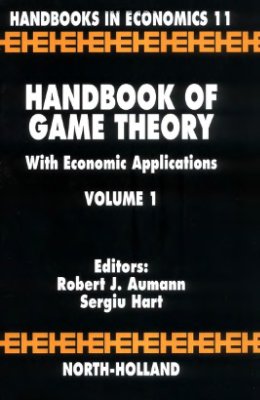North-Holland, 1992. - 760 Pages.
This is the first volume of the Handbook of Game Theory with Economic Applications, to be followed by two additional volumes. Game Theory has developed greatly in the last decade, and today it is an essential tool in much of economic theory. The three volumes will cover the fundamental theoretical aspects, a wide range of applications to economics, several chapters on applications to political science, and individual chapters on relations with other disciplines. The topics covered in the present volume include chess-playing computers, an introduction to the non-cooperative theory, repeated games, bargaining theory, auctions, location, entry deterrence, patents, the cooperative theory and its applications, and the relation between Game Theory and ethics.
This is the first volume of the Handbook of Game Theory with Economic Applications, to be followed by two additional volumes. Game Theory has developed greatly in the last decade, and today it is an essential tool in much of economic theory. The three volumes will cover the fundamental theoretical aspects, a wide range of applications to economics, several chapters on applications to political science, and individual chapters on relations with other disciplines. The topics covered in the present volume include chess-playing computers, an introduction to the non-cooperative theory, repeated games, bargaining theory, auctions, location, entry deterrence, patents, the cooperative theory and its applications, and the relation between Game Theory and ethics.

